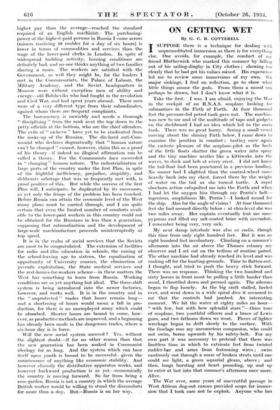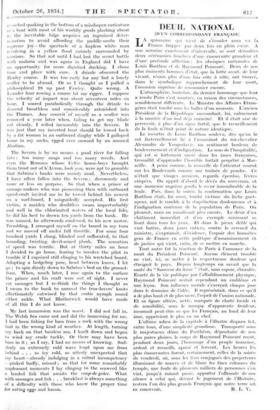ON GETTING WET
By G. C. B. COTTERELL
else. One avoids, for example, the conduct of my friend Blatherwiek who marked this summer by falling out of his sailing-dinghy in City clothes ; showing too clearly that he had got his vahies mixed. His.experience led me to review some immersions of my own. Six -major sinkings, I find on reflection, go to ,show what little things amuse the gods. From them a moral can perhaps be drawn, but I don't know what it is. ISUPPOSE there is a technique for dealing with unpremeditated immersion as there is for everything Take the first. I was, I am afraid, enjoying the War in the cockpit of an R.N.A.S. seaplane looking for submarines in the Firth of Forth. At four thousand feet the pressure-fed petrol tank gave out. The machine was new to me and of the multitude of taps and gadgets on the dashboard I had no idea which led to the main tank. There was no great hurry. Seeing a small vessel moving about the shining Firth below, I came down to examine the position in comfort ; tasting once again the esoteric pleasure of the seaplane-pilot as the heels of the little floats shatter the green water into spray and the tiny machine nestles like a kittiwake into the waves, to duck and bob at every crest. I did not know the tail-float had been punctured in a previous landing. No sooner had I alighted than the control-wheel came heavily back into my chest, forced there by the weight of water on the tail as she turned turtle. A rapid shoehorn action catapulted me into the Forth and when I had let the oxygen hiss through my Perrin's belt— ingenious, amphibious Mr. Perrin !—I looked round for the ship. Alas for the angle of vision ! At four thousand feet she had seemed directly below : at chin-level she was two miles away. Her captain eventually lent me some pyjamas and filled my salt-coated briar with cavendish. I remember being very, very sick.
My next damp interlude was also ex coelis, though this time from only eight hundred feet. But it was an eight hundred feet involuntary. Climbing on a summer's afternoon into the air above the Thames estuary my observer and I set out on the tedium of routine patrol. The other machine had already reached its level and was making off for the hunting-grounds. Time to flatten-out, I thought, and tried to push the heavy stick forward. There was no response. Thinking the two hundred and sixty horses in front must be pulling a little harder than usual, I throttled down and pressed again. The ailerons began to flap loosely. As the big craft stalled, heeled over, and went down in a wide spiral dive it occurred to me that the controls had jambed. An interesting moment. We hit the water at eighty miles an hour- " with few, but with how splendid stars "—three tons of seaplane, two youthful officers and a brace of Lewis guns, and two fathoms down we went. Pieces of lighter wreckage began to drift slowly to the surface. With the fuselage rose my unconscious companion, who could not swim, borne upwards by his safety-belt. For my own part it was necessary to pretend that there was limitless time in which to extricate feet from twisted rudder-bar and arms from festooning wires ; swim cautiously out through a maze of broken struts until one could see light, a green aquarial gleam, above ; and then, lungs bursting and heart pounding, up and up to enter at last into that summer's afternoon once more. Alive.
The War over, some years of uneventful passage in West African dug-out canoes provided scope for immer- sion that I took care not to exploit: Anyone who has crouched quaking in the bottom of a misshapen caricature of a boat with most of his worldly goods plashing about in the inevitable bilge acquires . an ingrained deter- mination to avoid affording the paddle-snobs their supreme joy—the spectacle of a hapless white man revolving in a yellow flood entirely surrounded by saurians. So that not until I had lost the secret battle with malaria and was again in England did I have an 'opportunity for more dignified ducking. I chose time and place with care. A drizzle obscured the Henley course. It was to early fOr any but a lonely sculler to be abroad. Or so I thoUght as I" pulled a philosoPhical 28 up past Fawley.. Quite wrong. A Leander four rowing a course hit my rigger. I suppose the velocity of impact was about seventeen miles an hotir. I soared parabolically through the drizzle to descend breathless and considerably astonished into the Thames. Any conceit of myself as a sculler was remov=ed a' year later when, failing to get my blade cart cleanly,- I. rolled inexorably into the Severn: It was just that 'my inverted boat should be towed back by a fat woman in an outboard dinghy while I galloped home in my socks, egged ever onward by an amused Alsatian.
The Severn is by no, means a good river for falling into.: too many snags and too many weeds. And even the Romans whose Celtic house-boys brought them trout out of h'Avron, look you, were apt to grumble that Sabrina's banks were mainly mud. Nevertheless, I have often fallen into the Severn ; decorously and more or less on purpose. So that when a prince of sausage-makers who was pioneering then with outboard speed-craft invited me to be towed behind his newest on. a surf-board, I misguidedly accepted. His first victim, a maiden who doubtless swam imperturbably and well in the chlorinated waters of the local lido, he did his best to drown ten yards from the bank. He was unused, he afterwards confessed, to his new motor. Trembling, I arranged myself on the board in my turn and we moved off under full throttle. For some four hundred, yards I clung, blinded and suffocated, to that bounding, twisting, devil-seized plank. The sensation of speed was terrific.. But at thirty miles an • hour I decided to go home, fearing to involve the pilot in trouble if I capsized still clinging to his wretched board. Adopting a. hedgehog pose, head between knees, I let go ; to spin dizzily down to Sabrina's bed on the ground- floor. When, much later, I rose again to the surface the prince and his craft were out .of sight. I never eatsausages but I re-think the things I thought' as I swum to the bank to unravel the true-lovers' knots affectionately entwined by that erotic nymph round either ankle. What Blatherwick would have made of all this I do not know.
My last immersion was the worst. I did not fall in. The'Welsh Sea came out and did the immersing for me. I had been fishing for bass from a rock with the wrong bait in the wrong kind of weather. At length, turning my back on that bassless sea, I knelt down and began to. wind my , crude tackle. Or there may have been bass- in it ; as I say, I had no means of knowing. Sud- denly an extremely cold wave leapt upon me from behind . . . so icy cold, so utterly unexpected that my heart—already indulging in a mitral incompetency —pinked badly, missed ; so that for some remarkably unpleasant moments I lay clinging to the seaweed like a landed fish that awaits the coup-de-grdce. What with sausages and fish . . . breakfast is always something of a difficulty with those who know the proper time for eating eggs and bacon. •























































 Previous page
Previous page